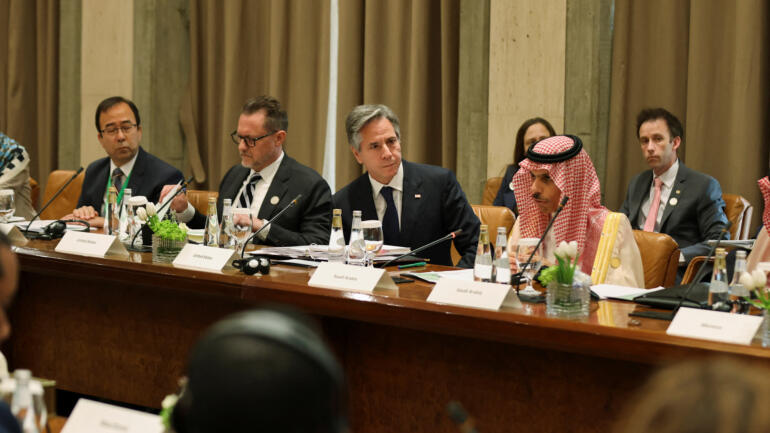U.S. Secretary of State Antony Blinken is on a three-day visit to Saudi Arabia amid frayed ties linked to disagreements. The two countries have not been seeing eye to eye on regional security issues, human rights, or oil prices.
Antony Blinken is on a visit to Saudi Arabia to advance strategic cooperation between the two countries.
The U.S. Secretary of State is also aiming to improve relations with other players in the Gulf.
The visit comes as regional allies in the Middle East have diversified their international engagements.
In April 2023, Saudi Arabia restored ties with Iran in a deal brokered by China.
In recent months, Riyadh has had closer ties with Beijing.
Saudi Arabia will be hosting an Arab-Chinese investment conference two days after Blinken’s visit.
China is also the largest purchaser of Saudi oil and the largest source of Saudi imports.
The U.S. maintains that it is still a strong player in the region.
U.S. Deputy Assistant Secretary of State Daniel Benaim told reporters this week that the U.S. is in the region to stay.
He added that the aim of Blinken’s trip is to say “we won’t leave a vacuum for other competitors to fill”.
Blinken has often warned of a geopolitical challenge from China.
However, he said on June 8 that they are not asking anyone to choose between the U.S. and China.
“The region would largely benefit from greater ties with China and also maintaining good ties with the United States,” Journalist and foreign policy analyst, Adnan Nasser told CGTN from Beirut, Lebanon.
He added “People have positive views to say about America with culture. And we have larger ties with the United States. But no one here has any negative views of the Chinese whatsoever. I have not come across that at all. And it’s a bit absurd to say that China is a geopolitical challenge.”
Beside’s China’s growing influence, Saudi Arabia and the U.S. have had other recent disagreements.
Saudi Arabia voted to re-admit Syria into the Arab League in May 2023, despite U.S. objections.
Blinken has also aimed to advance normalization of Saudi-Israeli relations.
But he’s been met with Saudi resistance.
“Recently the U.S. was frustrated with Saudi Arabia and the Arab League for re-admitting Syria into the organization, and now they would like to pressure Saudi Arabia to normalize [its] relationship with Israel. I can tell you most likely than not that will not happen,” Nasser said.
He added “The best thing that the American foreign policy makers can do is not interfere in the relationships of these countries.”
Blinken’s visit also comes days after Saudi Arabia has pledged to further cut oil output.
This move is designed to boost oil prices but adds to the list of decisions the U.S. opposes.
For more, check out our exclusive content on CGTN Now and subscribe to our weekly newsletter, The China Report.
 CGTN America
CGTN America
